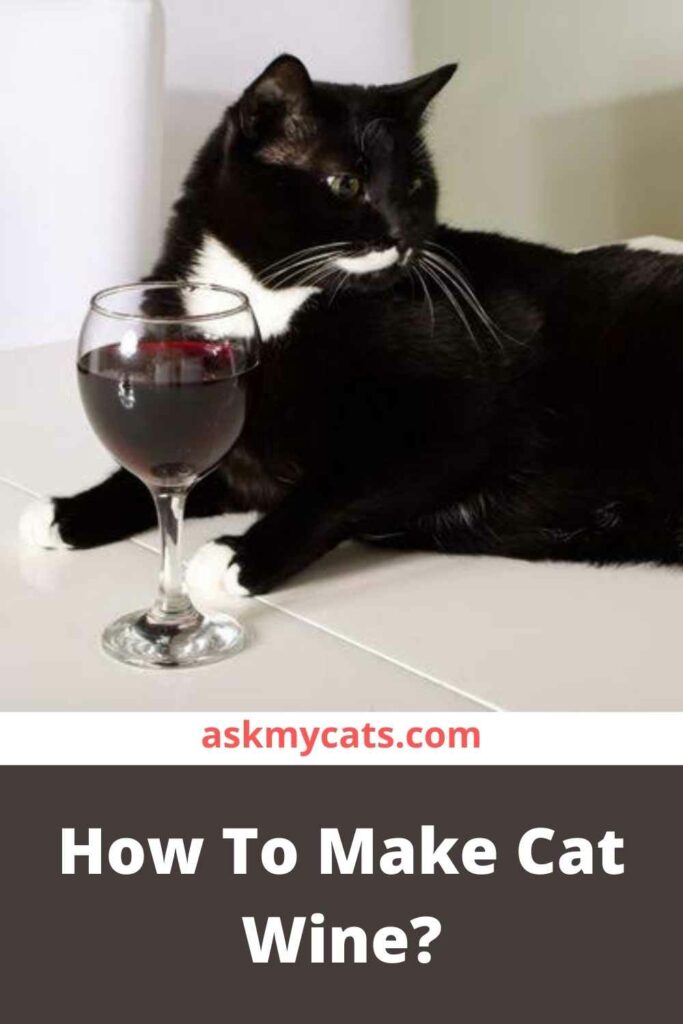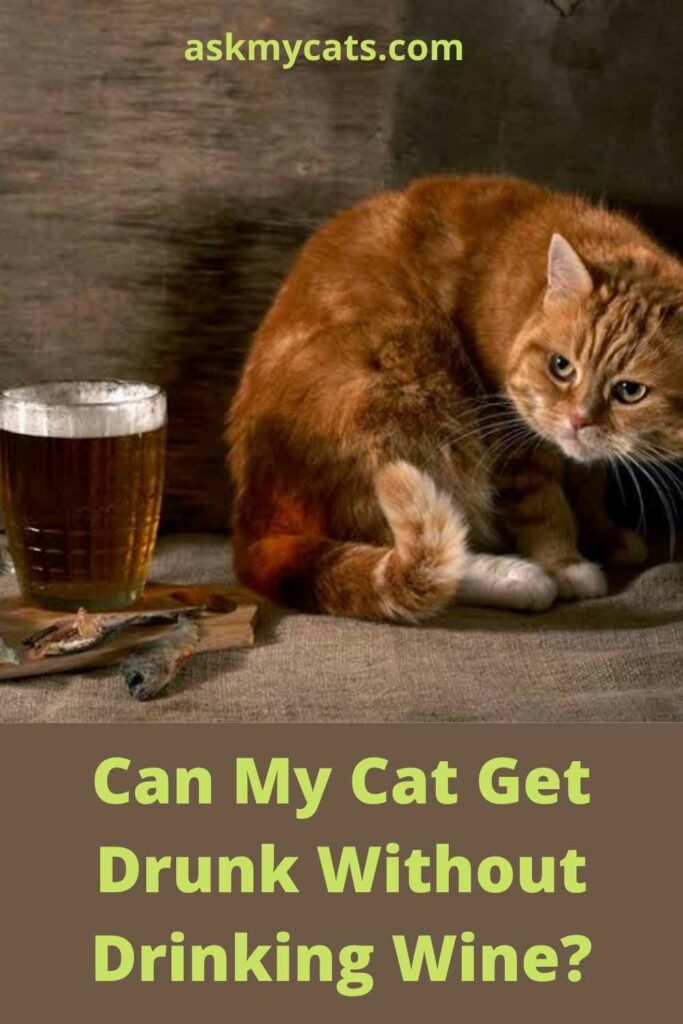Many cat owners enjoy a glass of wine in the evening to help them unwind. It’s not just a crisp and refreshing drink, but it may also help you relax after a long day at work, allowing you to spend some much-needed alone time on the couch with your cat.
However, if you observed your cat sipping from your glass while you were away in the kitchen, you might be wondering whether wine is okay for cats to drink or whether you should visit the veterinarian.
To answer your question, no, cats cannot drink wine. In reality, most domesticated pets, including cats, are poisoned by alcohol.
Although a tiny amount will not kill your cat. Owing to their small size, even a small dose can be harmful.
Keep reading to learn about the effects of wine on your feline friend!


Give Your Cat the Perfect Day
Get the Free Ebook!
Is It Okay For A Cat To Drink Wine?
No, it is not okay for a cat to drink wine. The liver and kidneys of a cat are incredibly busy and robust organs.
They are required to process and filter pollutants, assist in digestion, and promote waste disposal, among other things.
A fully grown adult cat, much less an innocent kitten, may be killed by what humans consider a little amount of alcohol, whether it’s grain alcohol, wine, beer, or something else.
The larger the percentage of alcohol or ethanol in a wine, the greater the risk to your cat’s health.
Is Wine Harmful To Cats?
Yes, wine is harmful to cats. However, it depends on how much wine the cat has consumed, when it last ate, and its general metabolism.
The most frequent response to alcohol in cats is a behavioral change. This usually results in the cat being either agitated or sleepy.
However, the long-term effects of alcohol consumption go beyond merely a shift in habit.
Even little amounts of alcohol can cause health problems in our cat .
As we had mentioned in one of our earlier articles about cats drinking alcohol, even modest amounts of wine can cause:
- Consciousness loss
- Failure of the kidneys
- Failure of the liver
- Difficulties with the lungs
- Heart attack
- Death
Even small quantities of wine might cause serious health problems for your fluffy buddy.
Can Cats Drink Red Wine?
No, cats cannot drink red wine. We advise that you should not offer alcohol to your cat. Also, ensure sure there is no spilt wine, beer, or liquor in reach of your cat.
If your cat can get up to them, ensure the outsides of the bottles have been wiped clean.
Alcohol has the potential to cause significant issues for your cat. Part of it is due to her small size, since it only takes a small amount of damage to trigger complications such as renal failure, liver damage, cardiac arrest, loss of consciousness, and even death.
What Happens When Cats Drink Wine?

Alcohol poisoning may occur in cats, just as it can in people, if they ingest too much alcohol.
For us, that necessitates a substantial amount of booze. It takes a lot less for cats, who are much smaller than we are.
So, you’re probably wondering what happens to a cat when it drinks? It all begins with a sensation comparable to that one you experience after drinking.
They are the first to get buzzing and may begin to lose coordination. However, because cats are impacted so much more than humans, the effects of alcohol can compound quickly in cats.
If your cat consumes too much, what begins as a buzz rapidly worsens, necessitating a trip to the doctor.
The symptoms of alcohol intoxication in cats are quite similar to the symptoms of alcohol poisoning in people.
Any of the following symptoms in your cat indicate that you should take them to the veterinarian:
- Disorientation
- Urination that is excessive
- Increased water consumption
- Lethargy
If your cat is suffering from severe alcohol poisoning, the following symptoms will appear:
- Seizures
- Tremors and muscle spasms
- Fainting
- Breathing that is slow and shallow
- Paralysis
You should take your cat to the veterinarian as soon as you notice these symptoms.
What Should I Do If My Cat Drinks Wine?
If you suspect your cat has consumed wine, see a veterinarian as soon as possible, since there is a strong possibility the cat will recover if treated promptly.
Ingesting a material that either includes alcohol, such as a beverage or fuel, or generates ethanol inside the body after consumption, such as uncooked pizza or bread dough, causes ethanol poisoning in cats.
Ethanol is swiftly absorbed and transported to the brain through the gastrointestinal system.
Waiting and seeing or attempting to diagnose ethanol poisoning on your own is not suggested since the symptoms are highly complicated, and the cat may have more than one symptom that you are unaware of.
We recommend taking a trip to your vet as soon as possible if you suspect ethanol poisoning in your cat.
Your vet may collect blood and urine samples from your feline. This will help determine if the kidneys are functioning properly.
If you suspect your cat has consumed any of the things listed above, you should seek medical attention as soon as possible.
Is There A Wine For Cats?
Yes, there is a wine available for cats. It is called cat wine.
The best cat wine is made by Apollo Peak in Colorado, and it comes in two varieties: MosCATo and Pinot Meow, both of which come in eight “Meownce” bottles.
Cat wine is made through catnip, beet-root and a variety of other substances. However, it does not contain alcohol.
Because of the catnip, the non-alcoholic beverage will have a mellowed out effect on a feline.
While the business claims that the catnip wine is healthy and pleasant for both cats and people, several veterinarians still remain sceptical.
Is There A Wine That Cats Can Drink?
Cat wine is a beverage made particularly for cats, and it’s become one of the most humorous trends in the wine-loving cat world.
Most significantly, cat wine is devoid of both alcohol and grapes. Grapes and raisins, as well as alcohol, are highly hazardous to pets. Catnip, beet juice, and natural preservatives are the most common ingredients in cat wine.
Catnip, which has a hallucinogenic effect on many cats, is used to make cat wine instead of alcohol. Around half of all cats are susceptible to the effects of catnip, although kittens are not until they are around three to six months old.
Your cat will be sensitive to cat wine if it is sensitive to catnip. Before going through the process of producing cat wine, you might want to try feeding catnip to your cat to see whether they react.
How To Make Cat Wine?

It’s really easy to make catnip wine. It just requires a few ingredients and is simple to prepare at home. Making catnip wine takes around twenty minutes total.
The benefits of producing it at home include the ability to utilise high-quality ingredients, the ability to make it strong or weak, the lack of need for colouring, preservatives, and added salt.
The ingredients required for making cat wine are:
- One cup dry catnip
- Three cups of water
- A few drops of beet-colored food colouring (optional)
- A few drops of flavor, for example, salmon oil (optional)
Directions:
- In a saucepan, combine the water and dried catnip.
- Simmer the solution for about 15 minutes on low heat.
- Remove from the heat and set aside to cool.
- Separate the web catnip using a cheesecloth or filter.
- Squeeze the liquid from the wet catnip and discard the wet catnip.
- Add beet food colouring (optional) to the catnip liquid to achieve the desired hue.
- Toss in some salmon or other flavorings (optional).
What Does Cat Wine Do To Cats?
Cat wine isn’t necessarily harmful in tiny doses, but it’s also not always helpful. Cat wine is more of a treat than anything else.
The wine does not contain any alcohol, but it does have a calming effect on cats due to the presence of catnip.
It could be acceptable as a one-time treat, but doctors probably wouldn’t advocate letting cats drink it on a regular basis.
It’s crucial to understand your cat’s anatomy and health before allowing him or her to take a drink. It is also a good idea to consult your veterinarian before adding anything new to your cat’s diet.
If the thought of your cat drinking cat wine still makes you uneasy, there are other options.
There’s also catnip tea, which you can create yourself by distilling catnip in water. You may also make ‘pawpsicles’ by freezing low-sodium chicken broth or tuna juice into ice cubes.
Can My Cat Get Drunk Without Drinking Wine?

Generally speaking, you won’t discover your cat drinking beer, wine, or strong liquor. They don’t like the flavor of these drinks, therefore they try to avoid them.
Other alcohol-containing recipes, on the other hand, may be more appealing to your kitty, and you should be aware of this.
Alcohol-based cakes are delicious and fragrant, but they still contain enough alcohol to harm your cat. While your cat is unlikely to drink pure tequila, they are far more likely to try a piece of cake.
Similarly, mixed beverages appeal to cats considerably more than beer or wine. These beverages are high in sugary sweeteners, which will easily persuade your cat to take a taste.
Other additives may also include alcohol. Vanilla flavour, for example, includes alcohol.
Cleaning products, mouthwash, and hand sanitizer are all examples of non-food goods that include ethanol. These are unlikely to appeal to your cat’s palate, but you never know what you’ll discover him licking up.
Frequently Asked Questions
Does Cat Wine Get Cats Drunk?
Cat wine is often prepared using beet juice, preservatives, and catnip, among other things. The wine does not contain any alcohol, but it does have a calming effect on cats due to the presence of catnip.
Do Cats Get Drunk On Wine?
Cats have an extremely poor tolerance for alcohol, and merely a few sips may get them ‘drunk.’ Wine is highly hazardous for cats and should never be consumed by them. Even one tablespoon of alcoholic drink can cause severe liver and brain damage, as well as death in rare circumstances.
How Much Cat Wine Do I Give My Cat?
One-third of the bottle of cat wine should be poured into a small bowl for your cat to drink.
Final Words
Wine is not safe for cats to drink, as you may have guessed. Wine’s ethanol is likely to poison your cat, and it won’t take much to do so.
There’s really nothing to worry about if your cat only took a few sips of wine. Keep a watch out for indications of alcohol poisoning so you can take them to the veterinarian if necessary.
While wine isn’t the most dangerous alcoholic beverage for cats, it’s still dangerous.
However, you may now share a buzz with your beloved cat thanks to innovative goods like cat wine. And, other from a great glass of wine and your favourite kitty, what else could you possibly require?
We hope that our articles on alcohol and wine has informed you and helped improve your relationship with your feline.
Drop down your queries regarding your furry friend in the comment section below. We will answer them soon.
